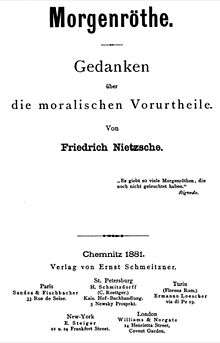The Dawn of Day
The Dawn of Day or Dawn or Daybreak (German: Morgenröte – Gedanken über die moralischen Vorurteile; historical orthography: Morgenröthe – Gedanken über die moralischen Vorurtheile; English: The Dawn of Day/ Daybreak: Thoughts on the Prejudices of Morality) is an 1881 book by the German philosopher Friedrich Nietzsche. The Nietzsche scholar Keith Ansell-Pearson writes that Dawn is the least studied of all of Nietzsche's works.[1]
 Title page | |
| Author | Friedrich Nietzsche |
|---|---|
| Original title | Morgenröthe a |
| Country | Germany |
| Language | German |
Publication date | 1881 |
| Preceded by | Human, All Too Human (1878) |
| Followed by | Idylls from Messina (1882) |
| a Morgenröte in Modern German. | |
Themes
Nietzsche de-emphasizes the role of hedonism as a motivator and accentuates the role of a "feeling of power." His relativism, both moral and cultural, and his critique of Christianity also reaches greater maturity. In Daybreak Nietzsche devoted a lengthy passage to his criticism of Christian biblical exegesis, including its arbitrary interpretation of objects and images in the Old Testament as prefigurements of Christ's crucifixion.
The polemical, antagonistic and informal style of this aphoristic book—when compared to Nietzsche's later treatments of morality—seems most of all to invite a particular experience. In this text Nietzsche was either not effective at, or not concerned with, persuading his readers to accept any specific point of view. Yet the discerning reader can note here the prefigurations of many of the ideas more fully developed in his later books. For example, the materialism espoused in this book might seem reducible to a naive scientific objectivism which reduces all phenomena to their natural, mechanical causes. Yet that is very straightforwardly not Nietzsche's strongest perspective, perhaps traditionally most well-expressed in The Gay Science.
Translations
- Nietzsche, Friedrich. The Dawn of Day. Translated by Kennedy, J. M.
- Daybreak: Thoughts on the Prejudices of Morality. Cambridge: Cambridge University Press. 1995. ISBN 9780521599634.
- Dawn: Thoughts on the Presumptions of Morality. Stanford: Stanford University Press. 2011. ISBN 9780804780056.
References
- "Nietzsche, the Middle Period". 3ammagazine.com. Retrieved 4 March 2018.
- Brooks, John Graham. "Book Review: The Dawn of Day. Friedrich Nietzsche". doi:10.1086/intejethi.13.4.2376284. Cite journal requires
|journal=(help)
External links
